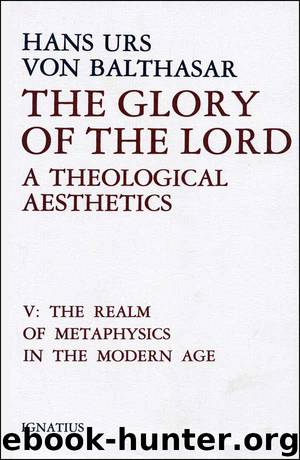The Glory of the Lord, Vol. 5 by Hans Urs von Balthasar

Author:Hans Urs von Balthasar [von Balthasar, Hans Urs]
Language: eng
Format: mobi
Tags: Spiritual & Religion
ISBN: 9780898702477
Publisher: Ignatius Press
Published: 2011-05-10T16:00:00+00:00
f. The Final Period
I. THE LEGACY OF GOETHE
To the extent that the overweening character of the Hegelian Geist (spirit) and its left-wing off-shoots fail to determine the nineteenth and twentieth centuries, these latter are influenced by the classical and the Goethean view of nature. These two paths remain clearly distinct even today. In the philosophy of spirit, the spirit comprehends nature as the object which serves it and which stands over against it, which it commands with exact scientific and technical means, applying it to its own ends. In the philosophy of Nature, on the other hand, the universe, in whatever way it is understood, is wholly comprehensive and is the landscape in which the Absolute encounters the spirit, and which makes it high-spirited, reverent and creative, setting a limit to its lust for technological supremacy. But in accordance with Goethe’s final lack of certainty, this universe retains its ambiguity even after him. It does not point to a transcendent unity beyond itself, as we find in Plotinus, for Christianity now occupies this space, which metaphysics accordingly avoids. It possesses its own unity, and thus its own glory, in itself, and the eros, which does not seek to penetrate beyond it, remains an anti-Christian ‘cosmogonic eros’. But while man’s gaze, stripped of its transfiguring longing, turns realistically to ‘the world as it is’, he is greeted by the fearful ‘ruminating horror’ into whose abysmal depths the young Goethe, following Bruno and Böhme, had peered. It is to this world that, if he can summon the strength, he must sing his Song of Yes and Amen with Zarathustra. Whatever he later feels in his ‘old heart’ of the ‘seafarer’s desire’ for ‘new shores’ must be bent back into the ‘nuptial ring of rings—the ring of (eternal) recurrence’.1
Because the classical substance increasingly recedes, both metaphysical projects—the philosophies of Nature and of spirit—must increasingly live from Christian material, despite their contradiction and rejection of it. Thus the concealed theological a priori element, which was characteristic of the late-classical and early medieval metaphysics of glory, now becomes manifestly Christian. In the philosophy of spirit, this takes the form of an adapted Augustinianism in Descartes, Malebranche, Rosmini; an adapted Paulinism in Kant; an adapted Johanninism in Hegel, Schelling and the later Fichte. In this way Christianity is positively reabsorbed. In the philosophy of Nature, on the other hand, there now occurs a spoliato Aegyptiorum in reverse: in the clear denial of Christian transcendence, the raiment of glory, which it reserves for the God of love and of the Cross, is removed from these and cast upon the members of the universe, or of that physis which Heidegger calls Being. But a universal philosophy which, precisely because it is anti-Christian, cannot and will not eschew religious pathos, must necessarily return via the path of ‘metaphysics’ to the mythic origins. The young Nietzsche in his Birth of Tragedy quite consciously completes a process begun by Creuzer, Görres and Lasaulx, and Heidegger will bracket off the whole ‘metaphysical’
Download
This site does not store any files on its server. We only index and link to content provided by other sites. Please contact the content providers to delete copyright contents if any and email us, we'll remove relevant links or contents immediately.
The Lost Art of Listening by Michael P. Nichols(6462)
Why I Am Not A Calvinist by Dr. Peter S. Ruckman(3767)
The Rosicrucians by Christopher McIntosh(3046)
Wicca: a guide for the solitary practitioner by Scott Cunningham(2702)
Signature in the Cell: DNA and the Evidence for Intelligent Design by Stephen C. Meyer(2495)
Real Sex by Lauren F. Winner(2466)
The Holy Spirit by Billy Graham(2408)
To Light a Sacred Flame by Silver RavenWolf(2350)
The End of Faith by Sam Harris(2279)
The Gnostic Gospels by Pagels Elaine(2023)
Nine Parts of Desire by Geraldine Brooks(2002)
Waking Up by Sam Harris(1953)
Heavens on Earth by Michael Shermer(1950)
Devil, The by Almond Philip C(1896)
Jesus by Paul Johnson(1882)
The God delusion by Richard Dawkins(1843)
Kundalini by Gopi Krishna(1821)
Chosen by God by R. C. Sproul(1754)
The Nature of Consciousness by Rupert Spira(1687)
